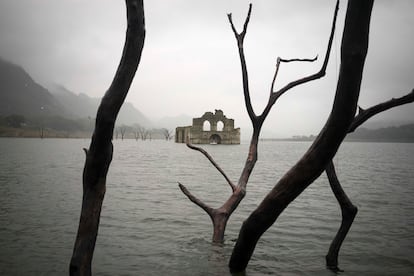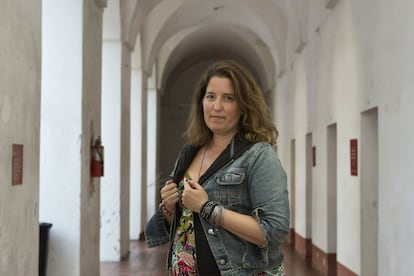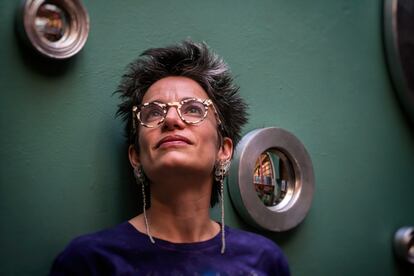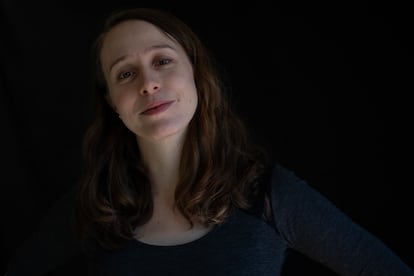The end of the world, as written by women, has neither zombies nor asteroids
Climate change with its extreme drought, hurricanes and floods figures in the work of Agustina Bazterrica, María Ferencuhová and Elisa Díaz Castelo, as in that of Margaret Atwood and Gabriela Jáuregui


The world ends and no gigantic, unpredictable asteroid has fallen. Neither have armies of zombies taken the cities. The world ends and it happens as we knew it would. Lakes and marshlands dry up, rivers are polluted, oceans boil; the air is unbreathable, plants and animals are dying, heat has risen to extremes, there is extreme rainfall, the winds are extremely strong. Then, fights over water, massive migrations, chaos. In the dystopias written by women what takes place is reality. At the Guadalajara International Book Fair (FIL), authors like Agustina Bazterrica, María Ferencuhová and Elisa Díaz Castelo present their works examining climate crisis, a subject also addressed by others such as Gabriela Jáuregui and Margaret Atwood.
The atmosphere is so oppressive it suffocates. Dozens of women survive trapped in a world where butterflies burn, where there are no more mammals and children don’t know what a tiger is, where all the seasons happen in a single week and stepping outside means having your skin break out, being smothered. The state disappeared long ago, incapable of containing the failure. Violence has taken advantage and is now everywhere.
Agustina Bazterrica’s protagonist in Las indignas [The unworthy] has no name. She was born years after they had to close the schools. Her mother died when they couldn’t go out to look for water or food after a brutal flood; the child survived and became a drifter. After years of wandering through devastated lands, she is on the brink of fainting when she arrives at the walls of a house, run by a religious cult, which functions as refuge and hell. Bazterrica’s world is cruel, but that’s because the world is cruel.

“There are people living their own dystopia at this very moment. Women in clandestine brothels being raped dozens of times a day. That is a dystopia. People who live on garbage. That’s another,” says the Argentinian writer, who uses her art history training, her visit to a monastery in Cusco, her exhaustive reading of the Bible and her ordeal at a convent as the seed for a novel where liberation does not seem to exist. With violent scenes of torture and women being sacrificed, Bazterrica again nods to reality: she took them straight out of documents detailing what the Argentine dictatorship did to kidnapped women, and the Inquisition to witches.
Violence against women does not end when the world ends. Margaret Atwood has written about this in The Handmaid’s Tale and The Testaments. “All it takes is a political, economic or religious crisis to bring women’s rights back into question,” Bazterrica says, recalling a prediction made by Simone de Beauvoir.
This view becomes even more compelling in the face of the U.N.’s persistent warning: women will suffer most from the planet’s crisis. They already make up 80% of all climate-displaced people. “Longer displacements increase exposure to violence outside the home,” says the international organization. The Geneva Centre for Security Policy has additionally found that gender-based violence soars in the aftermath of climate catastrophes. Practices like child marriage also increase. Families in Bangladesh, Ethiopia and Kenya, for example, forcibly marry off their daughters to make up for what has been lost in a drought, storm, or through repeat flooding.
In Feral (2022), Mexican writer Gabriela Jáuregui found a way out for women in a world that has withered after seven centuries. “Outside, it still rains blood. Outside, the palm trees die, the pines, the oceans spit out garbage and their monsters, the lakes dry, fill with poison,” goes her description of Mexico. And the women? “We hid ourselves, trembling with fear, with rage, anger, bristling, frazzled. To survive we vibrated so low we were subterranean. We sunk into foreign debris to save the world with each scream.” The women crawled into the earth, created caves, tunnels and burrows, endured without water, began to run on all fours, their long nails became claws. And so they survived, ready to keep a record of what happened. “While above everything burns, that which resists under the earth keeps digging until a possibility of future is built in the midst of catastrophe.”

Poetry in the face of disaster foretold
In 2011, Slovakian poet María Ferencuhová came across photographs of the aftermath of the earthquake in Haiti, the tsunami in Fukushima. She felt the images screamed “emergency” and wound up writing Threatened Species. “But in 2012, it was too early to raise one’s voice over planetary emergency in Slovakia,” she says in an event at FIL Guadalajara, “they thought poetry shouldn’t deal with such issues.” But she didn’t let go.
Years later she published Černozem [Black Earth], in which she explores a universe on the verge of collapse. “With a single exhalation / I will scatter bowls / dishes jugs vinegar tablecloths / dusty flowers books / towels and mattresses / I will break dirty windows / I will scour the earth / I will tear you up by your roots / I will water you with saliva / and let you dry,” she writes in the poem Drought. “We are creating stories about a vanishing world, but we cannot save the world with literature,” says the poet and film critic, who has turned poetry into the only way of channeling the urgency of rescue.
Elisa Díaz Sotelo doesn’t think she has figured it out. “I worry nearly every day about climate change, the sixth extinction in which we are immersed and even so, it is one of those subjects that I have not yet been able to deal with from the poetic,” says the Mexican, who approaches the matter indirectly in her latest collection of poems Planetas inhabitables [Inhabitable planets]. “I arrived at the red continent, where April has another name and one must dig in the earth so that the sun rises and it is daytime. There, the few bees that remain in the world and the synonym of the first words were still alive.”

Faced with this prospect, German creator Judith Schalansky — who has an asteroid named for her and is a collaborator at Oslo’s Future Library, an art project that has been worked on for 100 years and for which she delivered a “secret manuscript” addressed to whatever is left — proposes: “Our stories are wrong. We don’t need to build a hero who saves everything, but instead look for a collaborative project, a solution into which we all fit.” At the same fair, on another day, in another place, Díaz Sotelo offers her own remedy: “Literature is a habitable planet in a world that is less and less habitable. Even if we don’t use it as an escape, it is a way to face the crisis, to start working on it. These are just small worlds where one can stay and feel safe, at least for a while.”
Sign up for our weekly newsletter to get more English-language news coverage from EL PAÍS USA Edition
Tu suscripción se está usando en otro dispositivo
¿Quieres añadir otro usuario a tu suscripción?
Si continúas leyendo en este dispositivo, no se podrá leer en el otro.
FlechaTu suscripción se está usando en otro dispositivo y solo puedes acceder a EL PAÍS desde un dispositivo a la vez.
Si quieres compartir tu cuenta, cambia tu suscripción a la modalidad Premium, así podrás añadir otro usuario. Cada uno accederá con su propia cuenta de email, lo que os permitirá personalizar vuestra experiencia en EL PAÍS.
¿Tienes una suscripción de empresa? Accede aquí para contratar más cuentas.
En el caso de no saber quién está usando tu cuenta, te recomendamos cambiar tu contraseña aquí.
Si decides continuar compartiendo tu cuenta, este mensaje se mostrará en tu dispositivo y en el de la otra persona que está usando tu cuenta de forma indefinida, afectando a tu experiencia de lectura. Puedes consultar aquí los términos y condiciones de la suscripción digital.








































